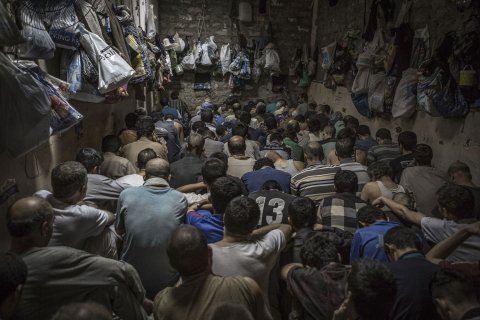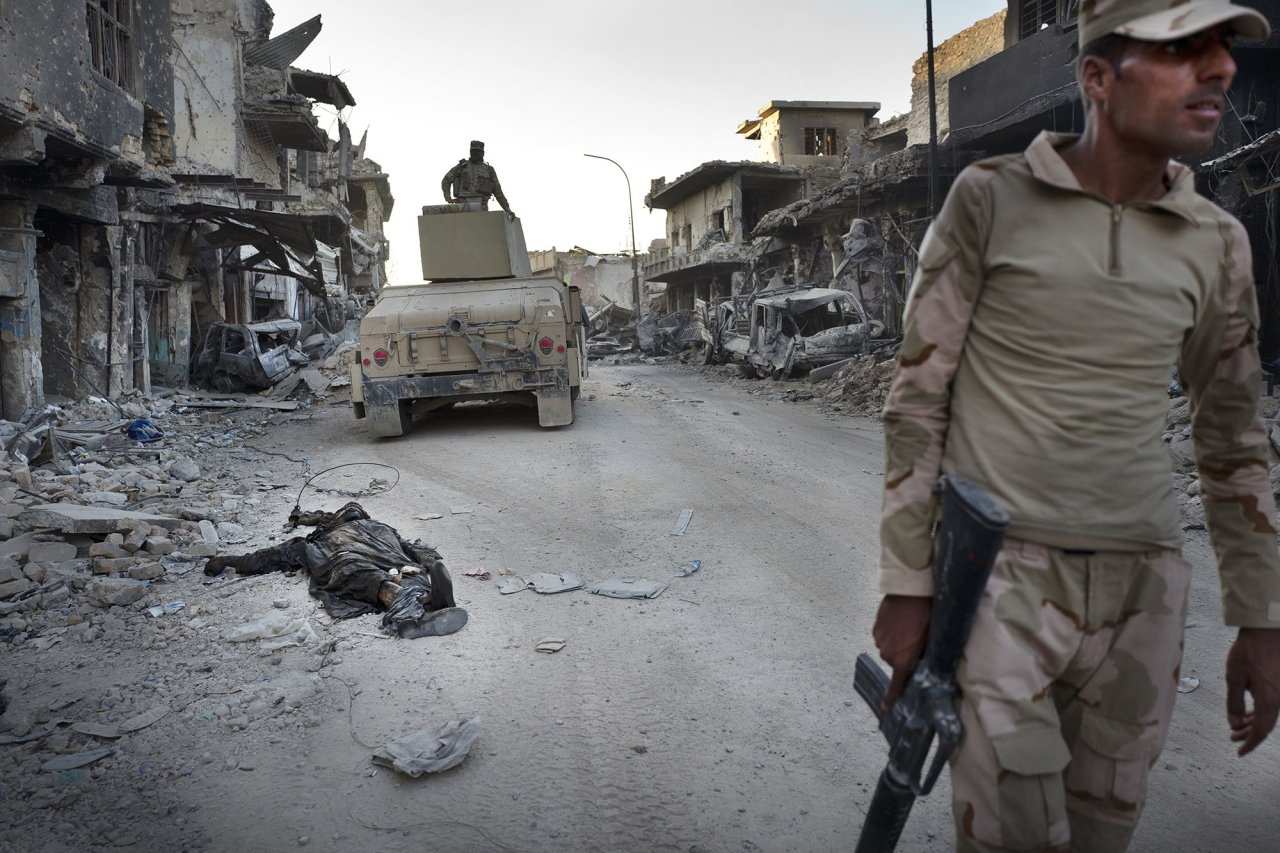Days after the Islamic State group fled Mosul, Saeed Quraishi was in a judge's office in Iraq's Nineveh province when two women arrived. They were handing over suspects with links to ISIS. But these weren't hardened fighters or even sympathizers. They were their children, all under the age of 3. "We don't want them," the women said. "Their fathers are [ISIS], and they raped us."
Quraishi watched as the women walked away, leaving their crying babies behind. He wondered if the women's families had pressured them to give up the children. "It was a horrible situation," says Quraishi, an Iraqi human rights worker, who asked to use a pseudonym because he feared for his safety. "Even if it was their decision, that is not easy."
The incident wasn't isolated. In the months since Iraqi forces ousted ISIS from Mosul, those reeling from the group's brutal treatment have been hungry for revenge. Many have cut ties with their families and accused neighbors of ISIS-related crimes. Others have become vigilantes, rendering justice as they see fit. Earlier this year, aid workers and journalists discovered more than two dozen bodies floating down the Tigris River near Mosul. The dead—many bound and blindfolded—were ISIS suspects, likely executed by state-affiliated forces.
ISIS's victims have good reason to be angry. After seizing Mosul in June 2014, the militants forced their draconian laws—no cigarettes, no mingling between men and women, no music or private internet—on the city's roughly 1 million residents. The group routinely tortured and executed civilians. They occupied homes, taking whatever they wanted. They trained child soldiers and enslaved women and children. When U.S.-backed forces started ousting fighters from the city last October, ISIS went on a rampage, executing suspected spies and civilians attempting to flee. Before losing Mosul in early July, the militants had killed or wounded more than 8,000 members of the Iraqi security forces.
Today, few Iraqis seem concerned about the treatment of ISIS suspects and their families. And defense attorneys are shunning ISIS clients for fear of ostracism and retribution. That fear was recently amplified, Human Rights Watch reported, after Iraqi authorities issued arrest warrants for more than a dozen lawyers defending ISIS suspects. All were charged with affiliating with the group.
The only people willing to stand up for the accused are workers from a handful of human rights groups. Scott Portman is one of them. He's the Middle East and North Africa director for Heartland Alliance International, a U.S.-based nonprofit that employs local lawyers and social workers in Iraq.
Portman says the country's current problems with retribution go back to 2015, when the Iraqi-led coalition ramped up its fight against the militants. In Tikrit, Ramadi and Fallujah, locals reported that government forces and militias were executing and abusing ISIS suspects, including teenagers and child soldiers.
But the scale of reported abuses multiplied during the recent battle for Mosul, the most populous city ISIS held in Iraq. Now, Portman says, the level of anger against perceived sympathizers is as bad as it was about a decade ago, during the bloodiest years of the Iraq War. Security forces, who suffered heavy losses against the militants, have packed hundreds of ISIS suspects—including minors—into fetid makeshift prisons. They've detained the militants' wives and children in camps. At one, described in a July U.N. report as "below humanitarian standards," 10 people died in eight days. Iraqi authorities have rounded up at least 1,400 more wives and children of ISIS suspects since then (though none have been brought before a judge). One reason they are purportedly doing so is fear of revenge attacks. "It is difficult to control people's desire for retribution," Portman says, "when they have lost so many of their friends."

That desire for vengeance makes it hard to guarantee due process in the courts. Even suspects with good lawyers may face inexperienced, overwhelmed or vengeful officials. Quraishi, who runs training workshops for judges and prosecutors on behalf of Heartland, says some are sympathetic to young fighters or people forced to join the group. But others, like one prosecutor he met at a workshop, see no difference between an ISIS leader and a 12-year-old recruit. "We should burn them," Quraishi recalls the man saying.
The staggering number of people being detained makes the situation even more difficult. Quraishi says that Kurdish and Iraqi authorities have locked up some 5,000 ISIS-linked juveniles. The overcrowding has led to a backlog in the country's courts; suspects can wait months to face a judge. When they finally do, the time judges spend reviewing their cases is often brief. Nineveh's counterterrorism court, which has been operating out of an abandoned home, was working its way through about 2,000 cases in early July, according to a forthcoming Human Rights Watch report. The Daily Telegraph reported that the 12 judges at that court were hearing between 40 and 50 cases a day.
Heartland and other human rights groups have been trying to mitigate these problems for ISIS suspects, some of whom are arrested and released in one city only to be rearrested in another. Psychologists and social workers are reuniting separated family members, finding solutions for orphaned children and investigating reports of mistreatment. Their legal teams are advising hundreds of judges, prosecutors and lawyers to carefully consider the circumstances of each case. "Were these people really radicals and criminals? Or are these people who were forced to be with ISIS?" Quraishi asks. "Are they juvenile victims, or are they murderers?"
Quraishi fears that mistreating or wrongfully convicting people could have serious consequences. Ostracized women and children, like those kids left at the Nineveh court, could become easy recruitment targets for extremist groups. And putting minors behind bars alongside hardened jihadi fighters, he adds, could create a new generation of killers.
"We need them to understand that rule of law considers everybody," he says, "the victims and the criminals."


















